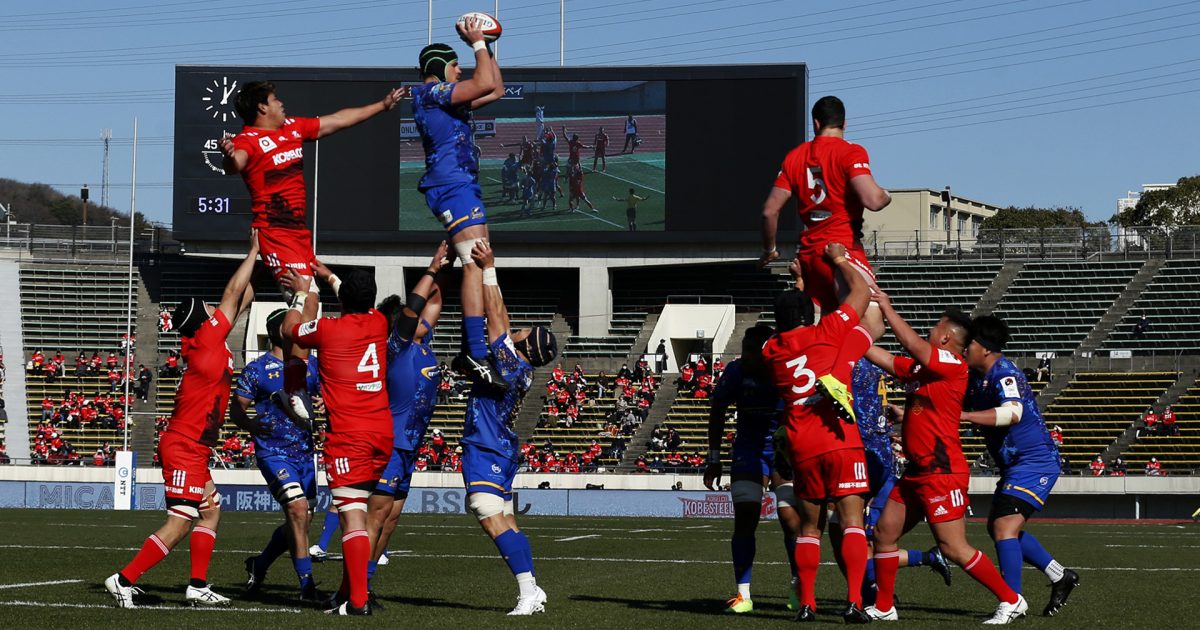Opening weekend of League One highlights big issue for Japan

Japan’s premier club rugby competition has always attracted its fair share of foreign talent, with the likes of former All Blacks Eroni Clarke, Glen Osborne, John Kirwan and Joe Stanley all spending periods of their careers representing sides in Japan. The number of international stars in the league now dwarves the smattering of semi-retired players that were once scattered amongst the teams, however, with over 40 foreign players featuring in the four games that made up the inaugural weekend of the rebranded League One competition.
That’s not a problem in itself. In fact, many trumpet the vast legions of foreign players as one of the selling points for the Japanese competition, with fans from around the world able to tune in and likely catch a glimpse of at least one or two expats from their own country plying their trade in the Land of the Rising Sun.
It’s not hugely dissimilar to France’s Top 14 competition in the early to mid-2000s, when swathes of Southern Hemisphere stars nearing the end of their professional careers headed north to bank a nice paycheck and spend some well-earned time in Europe.
The major difference between France and Japan, at least in rugby terms, is that France are very much a developed superpower who can beat anyone on their day. They have proven professional pathways and their age-grade systems are only getting stronger, as shown by the number of former Under 20s stars populating the current magnificent team. Japan, on the other hand, are still just developing as a rugby nation and while they’ll likely find a home in the Rugby Championship in the near future, they’ve still got a long way to go before they reach the heights of France.
There’s also a nagging fear that the crop of Japanese players that took the World Cup by storm in 2019 were once-in-a-generation talents. The Brave Blossoms were relatively easily swept away by their opposition in 2021 and men such as Michael Leitch, Yu Tamura and Kenki Fukuoka won’t be quite as threatening in 2023 – if they make it to the tournament at all.
As such, the importance of League One developing the next generation of players can’t be overstated and while the swathes of foreign stars should bring up the overall standard of the league and hopefully fast-track some local Japanese players’ development, those young players are going to have fewer opportunities for game time.
With 10 teams in the top division, that shouldn’t necessarily be a major concern, as there are still ample spots available for local up-and-comers, but there’s certainly one position that should be a concern for national coach Jamie Joseph, based on the opening weekend of the competition.
With two of the six scheduled games cancelled due to Covid, there were eight sides on display over the opening round and sixteen starting second-rowers. Of those starting second-rowers, just five were born in Japan.
Nakajima Shingo, Yoshiya Hosoda and Daiki Yanagawa started for the Shining Arcs, Green Rockets and Black Rams respectively while Yuta Kojima and Tatsuna Fujita partnered up for the Red Hurricanes.
Meanwhile, New Zealander-born players Jimmy Tupou, Warner Dearns, Jacob Pierce, Daymon Leasuasua and Hendrik Tui all earned starts, as did Wales internationals Jake Ball and Cory Hill, and Australia’s Harry Hockings, South African’s JD Schikerling, Tonga’s Amanaki Saumaki and Korea’s Seok-Hwan Jang.
Quade Cooper's Kintetsu Liners failed to get their Japan Rugby League One campaign off to a victorious start after they were beaten by the Mitsubishi Dynaboars on Monday. #JapanRugbyLeagueOne https://t.co/RSUZnsFECf
— RugbyPass (@RugbyPass) January 10, 2022
Of course, the world is a fluid place and where a player is born is not always the be-all and end-all when it comes to where their international allegiance lies. Tui moved to Japan for university and has been an ever-present member of the Japanese national side since 2012 while Dearns has followed a similar path, making his test debut in November.
The already-capped trio of Ball, Hill and Jang aside, the remaining foreign locks that featured in the opening round of League One could all theoretically represent Japan in the future – but that’s certainly not the ideal ‘development pathway’ for the national side of a team with top-level aspirations. The fact that it takes five years for foreign players to become eligible via residence makes this an even more fraught strategy.
The problem lies in the fact that foreign second-rowers tend to naturally have a physical advantage over their Japanese counterparts and League One clubs with title aspirations know they’ll have a significant advantage over their opposition if they can bring in some big bodies at lineout time.
There are certain restrictions in place in the competition which limits the number of foreign players in a matchday squad, but the JRFU hasn’t extended those restrictions to any positions, which means teams are better served by loading up their forward pack, where the bigger sized bodies are likely to have the biggest impact – and that could have long-term consequences on the national side.
With all 10 teams playing each week, the problem is less severe. Young Japan-eligible locks should still have opportunities to earn some minutes and develop their play to the point where, when the national side is in need of more cattle, they’re ready to step up to the mark. With international teammates and international opposition, they could also theoretically have their development fast-tracked.
Ultimately, however, the prominence of foreign second-rowers in Japan’s new League One competition probably highlights the lack of talent coming through in the position for the nation and could give national coach Jamie Joseph some cause for concern.





























































































Its not lack of talent, its genetics. There aren't that many big guys in Japan, and most of them go the martial arts route.